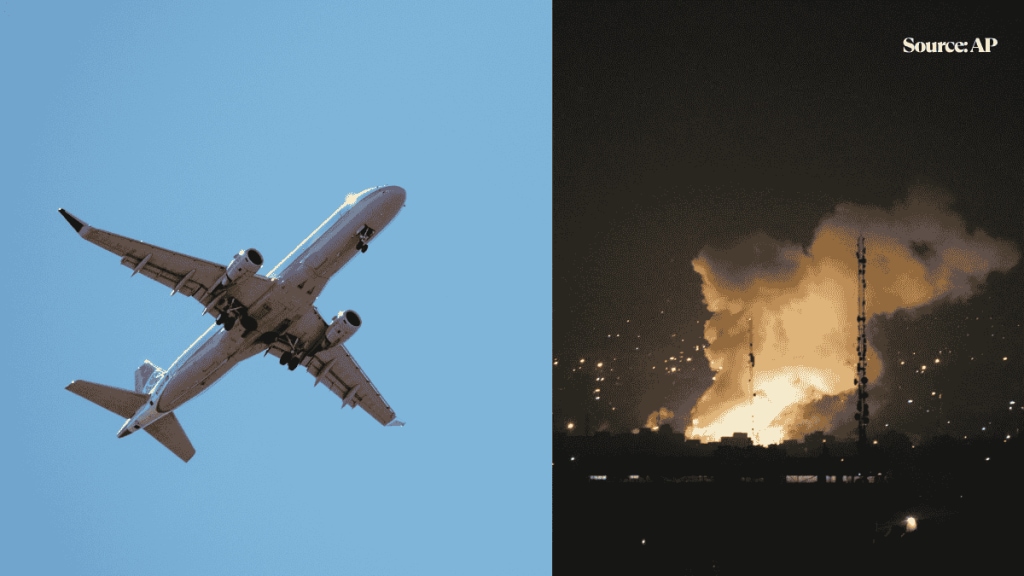Geopolitical tension across West Asia is likely to impact India’s aviation sector, as oil prices inch towards $100 per barrel.
The ongoing conflict between Israel and Iran has raised fears of a possible closure of the Strait of Hormuz—a key route for around 15 per cent of global oil supplies.
A recent report by Nuvama highlights the impact of rising tensions between Iran and Israel on India’s largest airline, IndiGo.
1. Oil price spike could hurt airlines
Analysts estimate that for every $10 increase in oil prices, IndiGo’s operating profit, or EBITDAR (earnings before interest, taxes, depreciation, amortization, and rent), for FY26 could fall by nearly 17 per cent.
These restrictions apply only to Indian carriers—not to foreign airlines. This means competitors from other countries can continue flying via more direct and cost-efficient routes, while Indian airlines are forced to reroute, leading to increased flying time and higher fuel consumption.
3.3 million bpd at stake as Iran’s oil output faces wartime strain
Israel and Iran continue to exchange missile and drone attacks, targeting energy infrastructure as well as residential areas. The conflict is fuelling global concerns about rising oil prices, as Iran is the third-largest producer among OPEC members, extracting around 3.3 million barrels per day (bpd) of crude oil.
An estimated 18 million to 21 million bpd of oil and oil products pass through the Strait of Hormuz along Iran’s southern coast, and there is widespread concern that the ongoing conflict could disrupt trade flows.
IndiGo unable to fully pass on fuel cost burden
The issue is particularly significant because it affects IndiGo’s international expansion plans—one of its key growth drivers. The airline aims to increase its international capacity (ASKM mix) to 40 per cent by 2030, up from around 30 per cent at present. Any disruption to these plans could undermine its long-term growth strategy.
2. Route changes increasing fuel use, crew hours, and travel time
On June 15, just days after the escalation of the Israel-Iran conflict, IndiGo issued a travel advisory alerting passengers about delays and modified flight paths. The airline posted on X that a total of 83 international flight cancellations had occurred over the previous six days due to multiple compounding challenges.
Tension between India and Pakistan has further compounded IndiGo’s operational difficulties. Since late April, both countries have restricted each other’s airspace for commercial flights. IndiGo has suspended flights to two Central Asian destinations due to this closure.
Flights taking off from the northern cities, such as Delhi, are the most impacted. According to the navigation data provided by Flightradar24, all airlines are seen taking a more circuitous route involving overflying Egypt, Saudi Arabia and the UAE.
“Based on additional travel distances due to route changes, affected flights, and our assumptions, we estimate a 1–3 per cent impact on IndiGo’s FY26E EBITDAR,” Nuvama noted.
3. Foreign carriers flying freely while Indian airlines face rerouting woes
As these restrictions apply only to Indian airlines, foreign competitors continue to operate through direct routes, avoiding the added costs and time associated with rerouting. This puts IndiGo at a strategic disadvantage.
“Indian airlines are forced to either absorb the higher costs or hike fares and risk losing passengers to foreign rivals,” experts say. This challenge comes at a time when Indian carriers have been steadily gaining international market share from foreign competitors. The new restrictions could stall that momentum.
